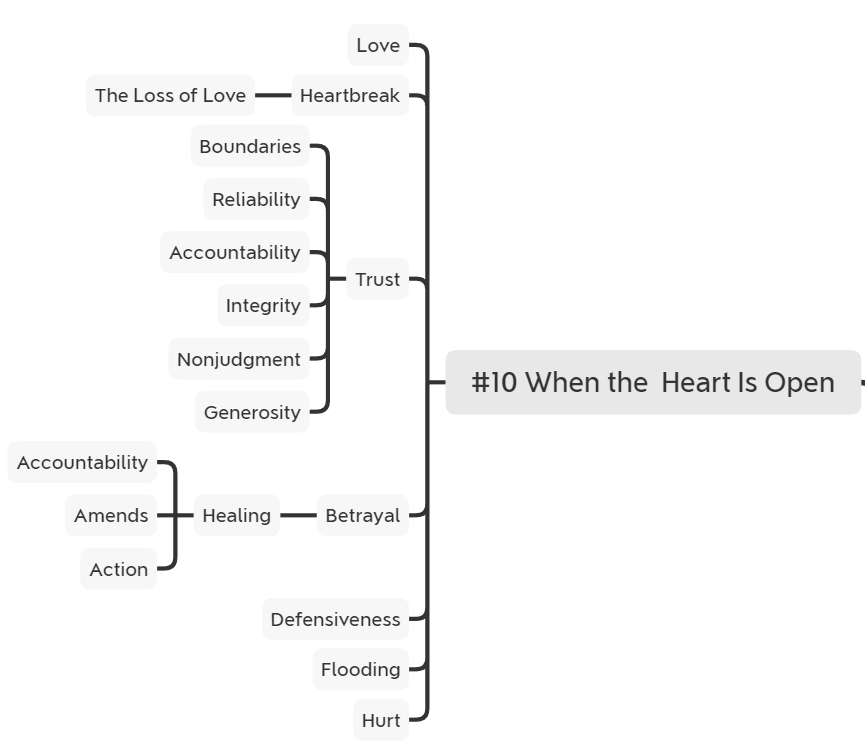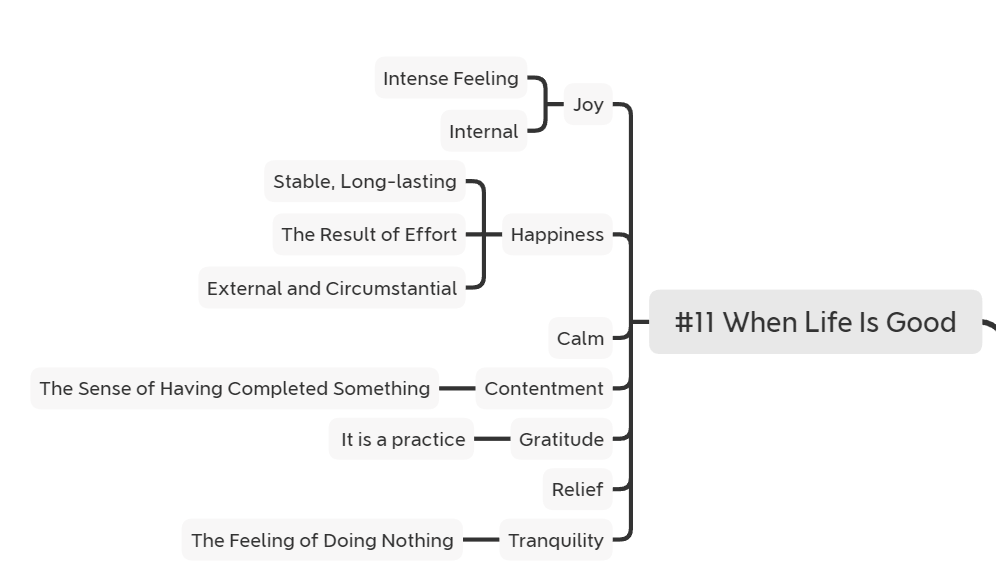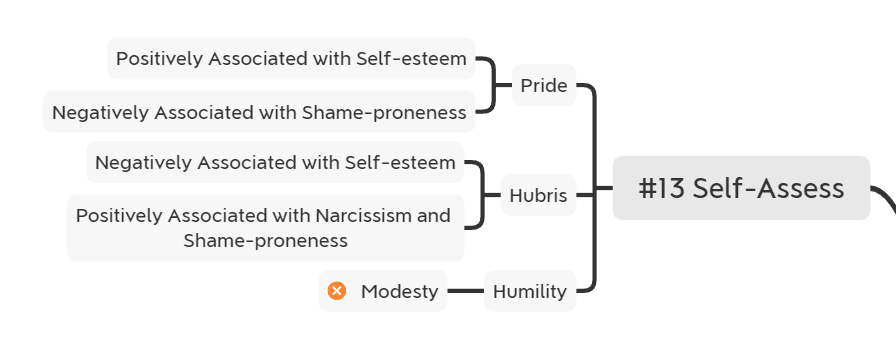#10 Places We Go When the Heart Is Open
Love, Heartbreak, Trust, Self-Trust, Betrayal, Defensiveness, Flooding, Hurt

1. Love:
We cultivate love when we allow our most vulnerable and powerful selves to be deeply seen and known, and when we honor the spiritual connection that grows from that offering with trust, respect, kindness, and affection.
2. Heartbreak:
Heartbreak is always connected to love and belonging. Heartbreak comes from the loss of love or the perceived loss of love.
Every time we love, we risk heartbreak.
The brokenhearted are the bravest among us—they dared to love.
3. Trust:
7 elements of trust: Boundaries(clear about okay or not okay, willing to say no), Reliability(commitment and not overpromise), Accountability(you own your mistakes, apologize, and make amends), Vault(keep secret), Integrity, Nonjudgment, Generosity
Self-trust:
B—Did I respect my own boundaries? Was I clear about what’s okay and what’s not okay?
R—Was I reliable? Did I do what I said I was going to do?
A—Did I hold myself accountable?
V—Did I respect the vault and share appropriately?
I—Did I act from my integrity?
N—Did I ask for what I needed? Was I nonjudgmental about needing help?
G—Was I generous toward myself?
4. Betrayal:
A violation of trust.
The only way back from betrayal is accountability, amends, and action.
5. Defensiveness:
Defensiveness is a way to protect our ego and the fragile self-esteem.
When defensive, we often get tunnel vision and start planning what we're going to say instead of listening.
6. Flooding:
A sensation of feeling psychologically and physically overwhelmed during the conflict, making it virtually impossible to have a productive, problem-solving discussion.
7. Hurt
We get pissed off, or we hurt back, or we internalize the hurt until we believe we deserve it and that something is wrong with us. But rarely do we say “This really hurt my feelings.” It’s simple, vulnerable, and honest.
When we respond to hurt feelings with anger, the other person tends to match our anger with more anger. However, when a repair seems possible and we share our hurt feelings and try to reconnect without the anger, the other person tends to respond with constructive actions including apologies and amends.
Sentences & Words Bank
Vault保险库
tunnel vision
grounded confidence 坚韧的自信
#11 Places We Go When Life Is Good
Joy, Happiness, Calm, Contentment, Gratitude, Foreboding Joy, Relief, Tranquility

1. Joy:
Joy is an intense feeling of deep spiritual connection, pleasure, and appreciation. While experiencing joy, we don’t lose ourselves,we become more truly ourselves.
2.Happiness:
Happiness is stable, longer-lasting, and normally the result of effort. It’s lower in intensity than joy, and more self-focused. With happiness, we feel a sense of being in control. Unlike joy, which is more internal, happiness seems more external and circumstantial.
3. Calm:
Creating perspective and mindfulness while managing emotional reactivity.
4. Contentment:
Contentment is the feeling of completeness, appreciation, and “enoughness” that we experience when our needs are satisfied.
5. Gratitude:
Gratitude is a practice. It makes us appreciate the value of something, and when we appreciate the value of something, we extract more benefits from it
6. Relief:
Feelings of tension leaving the body and being able to breathe more easily, thoughts of the worst being over and being safe for the moment, resting, and wanting to get on to something else.
7. Tranquility
Tranquility is associated with the absence of demand and no pressure to do anything.
With contentment, we often have the sense of having completed something;
With tranquility, we relish the feeling of doing nothing.
#12 Places We Go We Feel Wronged
Anger, Contempt, Disgust, Dehumanization, Hate, Self-Righteousness
1. Anger:
We feel when something gets in the way of a desired outcome or when we believe there’s a violation of the way things should be.
2. Contempt:
With contempt, we look down on the other person and we want to exclude or ignore them.
Motive attribution asymmetry:the assumption that your ideology is based in love, while your opponent’s is based in hate.
3. Dehumanization:
Dehumanizing always starts with language, often followed by images.
4. Hate:
A lack of direct contact with hated individuals can actually strengthen hate.
5. Self-Righteousness:
Self-righteousness is the conviction that one’s beliefs and behaviors are the most correct.
People who exhibit self-righteousness see things as black and white—they tend to be closed-minded, inflexible, intolerant of ambiguity, and less likely to consider others’ opinions.
When feeling self-righteous, we feel morally superior to others and are trying to convince ourselves or others that we are doing the right thing.
#13 Places We Go to Self-Assess

Pride, Hubris, Humility
1. Pride:
Pride is a feeling of pleasure or celebration related to our accomplishments or efforts.
Authentic pride typically has a positive connotation and descriptors that include words like “accomplishment,” “mastery,” “triumph,” “confidence,” and “self-worth.” Hubris, fear, shame, defensiveness are not pride.
It is positively associated with self-esteem and negatively associated with shame-proneness.
2. Hubris:
Hubris is an inflated sense of one’s own innate abilities that is tied more to the need for dominance than to actual accomplishments. Hubris can increase levels of dominance, and dominance “does not require respect or social acceptance.”
It is negatively correlated with self-esteem and positively correlated with narcissism and shame-proneness.
3. Humility:
Humility is openness to new learning combined with a balanced and accurate assessment of our contributions, including our strengths, imperfections, and opportunities for growth.
Downplaying yourself or your accomplishments is modesty, not humility.